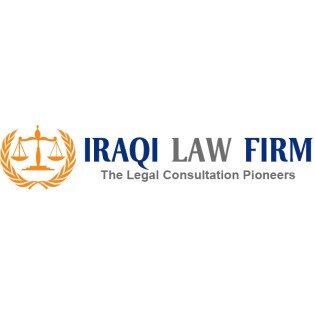Best Employer Lawyers in Iraq
Share your needs with us, get contacted by law firms.
Free. Takes 2 min.
Or refine your search by selecting a city:
List of the best lawyers in Iraq
About Employer Law in Iraq
Employer law in Iraq covers a range of legal aspects related to employment relationships, including labor contracts, workers' rights, safety regulations, and employer obligations. The legal framework seeks to balance the rights and duties of employers and employees, ensuring a fair working environment while promoting economic growth. Understanding these laws helps employers stay compliant and protects employees' rights to fair treatment and safe working conditions.
Why You May Need a Lawyer
There are several common situations where individuals or businesses may require legal assistance concerning employer issues in Iraq:
- Drafting or reviewing employment contracts to ensure compliance with local laws.
- Handling disputes related to workplace discrimination, harassment, or wrongful termination.
- Navigating complex labor regulations and compensation matters for employees.
- Resolving issues related to employee benefits, such as health insurance and legal entitlements.
- Assistance in restructuring or downsizing processes while adhering to legal standards.
Local Laws Overview
Iraq's labor law framework includes several key aspects relevant to employers:
- Employment Contracts: Contracts must comply with specific legal requirements and clearly outline terms, duties, and conditions.
- Working Hours and Overtime: Regulations determine maximum working hours and overtime pay, ensuring workers have adequate rest periods.
- Minimum Wage: Laws set a minimum wage standard to ensure fair compensation for all workers.
- Health and Safety: Employers must adhere to safety standards to minimize workplace hazards and ensure a safe environment.
- Termination Procedures: Legal guidelines dictate acceptable reasons and procedures for terminating employment to prevent wrongful dismissals.
Frequently Asked Questions
1. What is the probationary period for new employees in Iraq?
In Iraq, the probationary period is typically three months, giving employers an opportunity to assess new employees' suitability for the job.
2. Are employers required to provide health insurance?
Yes, Iraqi law mandates that employers provide health insurance to employees as part of their benefits package.
3. What are the legal working hours in Iraq?
The standard legal working hours in Iraq are generally 48 hours per week, typically divided into six working days.
4. How is overtime compensation calculated?
Overtime compensation may be subject to higher pay rates compared to regular working hours, often dictated by the employment contract and labor laws.
5. What are the rights of employees in case of redundancy?
Employees affected by redundancy are entitled to severance pay and must be given adequate notice or payment in lieu.
6. How are disputes between employers and employees resolved?
Employment disputes in Iraq can be resolved through negotiation, mediation, or legal proceedings if necessary.
7. Is there a minimum wage law in Iraq?
Yes, Iraq has established a minimum wage law to ensure employees receive fair compensation for their work.
8. Can an employee be dismissed without notice?
Dismissals without notice are generally only permissible in cases of serious misconduct or repeated violations of employment terms.
9. What are the tax obligations for employers?
Employers are required to withhold tax on employees' behalf and contribute to social security programs as per Iraqi tax regulations.
10. What measures are in place to ensure workplace safety?
Employers must comply with health and safety regulations to minimize risks and ensure a secure work environment for employees.
Additional Resources
Here are some resources and organizations that can provide further guidance and support related to employer issues in Iraq:
- Ministry of Labor and Social Affairs: Provides information on labor laws and employer obligations.
- Iraqi Bar Association: Offers access to qualified lawyers specializing in employment law.
- Chambers of Commerce: Can provide consultancy and resources for businesses operating in Iraq.
Next Steps
If you require legal assistance regarding employer issues in Iraq, consider the following steps:
- Identify the specific legal issue or question you need help with.
- Research and consult with a qualified attorney specializing in Iraqi employment law to understand your legal position and options.
- If dealing with a complex legal matter, gather relevant documents and evidence to present to your lawyer for a comprehensive case review.
- Utilize available resources and expert guidance to ensure compliance with Iraqi labor laws and resolve any disputes effectively.
Lawzana helps you find the best lawyers and law firms in Iraq through a curated and pre-screened list of qualified legal professionals. Our platform offers rankings and detailed profiles of attorneys and law firms, allowing you to compare based on practice areas, including Employer, experience, and client feedback.
Each profile includes a description of the firm's areas of practice, client reviews, team members and partners, year of establishment, spoken languages, office locations, contact information, social media presence, and any published articles or resources. Most firms on our platform speak English and are experienced in both local and international legal matters.
Get a quote from top-rated law firms in Iraq — quickly, securely, and without unnecessary hassle.
Disclaimer:
The information provided on this page is for general informational purposes only and does not constitute legal advice. While we strive to ensure the accuracy and relevance of the content, legal information may change over time, and interpretations of the law can vary. You should always consult with a qualified legal professional for advice specific to your situation.
We disclaim all liability for actions taken or not taken based on the content of this page. If you believe any information is incorrect or outdated, please contact us, and we will review and update it where appropriate.
Browse employer law firms by city in Iraq
Refine your search by selecting a city.

















